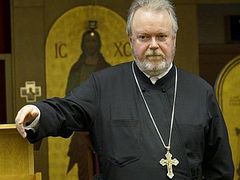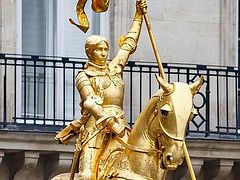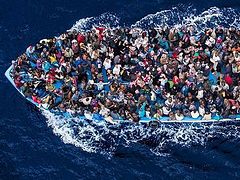There are Romanian, Bulgarian, Serbian and Russian parishes on Malta. The Russian parish is named after Saint Apostle Paul. It was formed in 2001 and officially recognized by the Synod of the Russian Orthodox Church in the summer of 2003.
Just like other Orthodox parishes on Malta, the Russian community does not have its own church, so the services are held in the Greek Catholic Church of Our Lady of Damascus located in Archbishop Street, Valetta. Since early 2000, many efforts have been made to acquire a building for the parish. At first, the hope was to build the church on the territory of the Russian Embassy, then to acquire title to the unused building of the Russian Trade Mission and, finally, to buy the Catholic Church of St. Ignatius of Loyola. However, all these options were rejected, sometimes because of the uncompromising attitude of the Russian authorities, and sometimes, as in case of the Catholic church, because of the decision of the church superiors. Such was probably the Will of God.
After a long approval process, general permission of the Maltese authorities was obtained to build the church on a land plot leased in 2014. However, considering the Maltese circumspection with respect to the building of non-Catholic churches, it is yet unclear when an Orthodox church will be built on St. Paul’s Island. It is not a matter of money (financing will probably be available), but rather a matter of overcoming all bureaucratic barriers and obtaining consent of the local communities.
Currently the services in the Russian parish are not held very often because the priest, Father Dimitry Netsvetayev, lives in Tunisia and usually visits Malta every two months. During the few days that Father Dimitry spends on the island, he celebrates the Divine Liturgy, performs the requested ceremonies, and meets and talks to the people. Six liturgies are celebrated during a year. Of course, this number is much lower than the number of services held back home, but many Russians on Malta are happy to have an opportunity to attend a service in Slavonic at least several times a year. Some parishioners also attend services in the Serbian parish (especially because the Serbs follow the Julian calendar), but services in that parish are not frequent either.
During my short tip to Malta, I had a chance to talk to one of the parishioners of the Russian Orthodox community. Before joining the church choir, Yulia Belozyorova had been the treasurer of the Parish Council for several years. She has been living on Malta since 2000. Born in Vladivostok, Yulia came to Malta to study and get a bachelor’s degree in an English-speaking educational establishment. While getting her education, Yulia met her future husband. Stephan, a native-born Maltese, was a postgraduate in the University that Yulia attended and taught some classes to her group. They were wed in Vladivostok after receiving the blessing of His Eminence Veniamin. The special blessing of the bishop was required because Yulia’s husband was (and still is) a Catholic. Today the couple is raising two sons, living on Gozo Island (one of the three largest islands of the Maltese archipelago).
“Our family wasn’t very religious and in Vladivostok we went to church only on feast days,” says Yulia. “In fact, I became more religious on Malta, influenced in many ways by my elder sister (who also married a Maltese and now lives in the UK with her family). In 2001, I went to my first confession on Malta. Then, Matushka Svetlana, Father Dimiry’s wife, invited me to sing in the church choir.
Yulia says that she decided to keep attending the services and to become a practicing Orthodox Christian because she felt in her heart a profound and sincere love of God and realized that faith helps her become a better person. She also wanted her children to be Orthodox.
“My husband attends Liturgies with me and helps with the children,” says Yulia. “He says that he likes our services and feels calmness and tranquility when he attends them. I really appreciate it, for we have quite a few families in which the Maltese husbands do not let their wives attend the Orthodox services. In such families the children are usually baptized into Catholic faith.”
“Why do husbands object? Is it because they want their children to be Catholic?”
“Sometimes our women do not believe that it is important. They say, ‘Let it be the way my husband wants. If he wants the children to be Catholic, I won’t object.’ Of course, things are different in families where wives are religious, but such families are in the minority.”
“Did your husband wish to convert to Orthodoxy?”
“Unfortunately, no. I do not insist on it. Maybe it will happen eventually.”
Yulia admits that her spiritual life on Malta suffers because the services are infrequent and there is no opportunity for frequent confession and communion. Naturally, attending Liturgy only once every two months may hinder spiritual development. But what stops Yulia from attending weekly Liturgies in the Romanian church? Father John welcomes everybody, irrespective of their nationality.
“Unfortunately, since the services are in Romanian, they are not very easy to follow,” says Yulia. “The same goes for the Serbian parish. I prefer attending Serbian services rather than Romanian, but the Serbian priest also visits infrequently, only twice a month. That is why I am very happy that there are services in Church Slavonic, even though they are not frequent. Father Dimitry’s visits always feel like great feast days. He became a very close person to us, a spiritual mentor.”
“Still, do you ever think about returning to Russia to have more opportunities to attend services in Church Slavonic?”
“No. Even when I come to Russia, I feel like a foreigner. I have spent 17 out of 36 years of my life on Malta. There are a lot of good people here too. I got used to Malta and feel at home here. Maltese people are wonderful. They are family-oriented, very religious and have a very respectful attitude to their parents. Even though Malta is a small country, there are more churches here than days in a year. In this respect, I’m very happy to be married to a Maltese. The country is so religious that even abortions are banned here.”
“However, despite the religiosity of the Maltese and influence of the Catholic Church, same sex marriages were nevertheless legalized on Malta…
“Honestly, I’m still in shock and can’t understand how it happened. Perhaps, politics was a factor here.”
“Yulia, considering the conditions of a certain political dictate that exists on Malta, do you think we can expect the education system to follow the moral and ethical norms that do not instill liberal views on religion, family or society in children?”
“There are three types of schools on Malta: private, public and Catholic. My elder son used to go to a public school where religion studies weren’t advanced. Then we got lucky and he was admitted to the Catholic school in Rabat, which he attended until we moved to Gozo Island. The school was very traditional, for boys only. The director and other school officials were Catholic priests. Naturally, there were advanced religion studies and the children attended church services.
“So your son had to study in a strictly Catholic environment?”
“Yes, because there are very few non-Catholics on Malta. But Matthew already understands his identity and knows that his life is based on principles that are different from those of his peers. He even began keeping a stricter Lent and didn’t eat any sweets. He was the only one in his class who refused to eat chocolate and sweets at teatime. By the way, his Catholic peers only respected him more for that. Mathew told us about it with childish joy, when we gathered together as a family.”
Yulia said that there were some difficulties with the Orthodox identity of her younger son. It is not customary for Catholic children to wear baptismal crosses, so in the kindergarten Daniel was forced to take off his baptismal cross under the pretense of safety (the chain could allegedly lead to suffocation). Yulia persuaded the kindergarten teachers to let her son wear the baptismal cross, but she experienced quite a few unpleasant moments, when the educational authorities tried to pressure her. Luckily, the boy was not expelled from the kindergarten. Still, the fact of such pressure being exerted on people in a Christian country is, of course, unfortunate.
Undoubtedly, Malta was and still is a strictly Catholic country with a barely noticeable Orthodox minority, and cases of Maltese people converting to Orthodoxy are exceptionally rare. According to Father Dimitry, there were only two such cases since January 2001. In one case, it was a professor who came to the conclusion that Orthodoxy was a more correct faith than Catholicism. The second case was a man who wanted to marry an Orthodox woman. That is why at this time the most important thing for the Orthodox minority on Malta is to preserve their faith and identity, remaining different in a way that is pleasing to God, despite the Maltese laws and influence of the Catholic majority.







